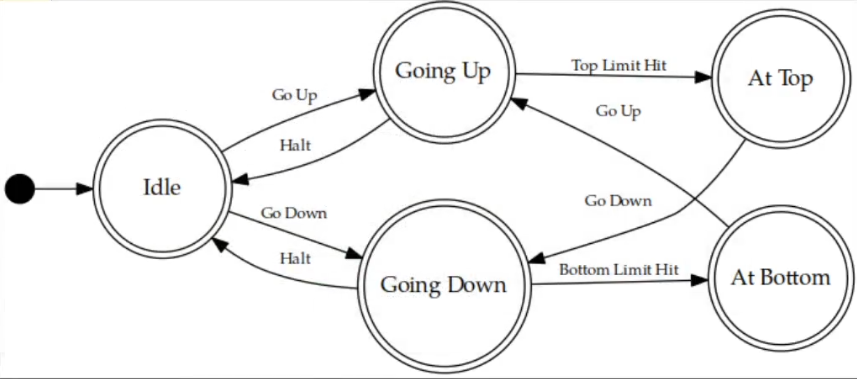1
2
3
4
5
6
7
8
9
10
11
12
13
14
15
16
17
18
19
20
21
22
23
24
25
26
27
28
29
30
31
32
33
34
35
36
37
38
39
40
41
42
43
44
45
46
47
48
49
50
51
52
53
54
55
56
57
58
59
60
61
62
63
64
65
66
67
68
69
70
71
72
73
74
75
76
77
78
79
80
81
82
83
84
85
86
87
88
89
90
91
92
93
94
95
96
97
98
99
100
101
102
103
104
105
106
107
108
109
110
111
112
113
114
115
116
117
118
119
120
121
122
123
124
125
126
127
128
129
130
131
132
133
134
135
136
137
138
139
140
141
142
143
144
145
|
#include <stdio.h>
#include <conio.h>
#include "stdlib.h"
#include "math.h"
enum state_codes { _idle=0, _goingUp=1, _goingDown=2, _AtTop=3, _AtBottom=4, _malfunction=5, _unexpected=6, _end=7 };
enum ret_codes { up=0, down=1, halt=2, top=3, bottom=4, fail=5, quit=6 };
enum state_codes x = _idle;
int target_floor_number = 8;
int current_floor_number = 1;
int accumulated_floor_number = 0;
#define TOP_FLOOR 9
#define BOTTOM_FLOOR 1
int event_idle(void){
printf("Idle!\n");
printf("Input target floor number in [1, 9] (which floor you want to go?): \n");
target_floor_number = getch() - '0';
if(current_floor_number < target_floor_number)
return up;
else if(current_floor_number > target_floor_number)
return down;
else if(current_floor_number == target_floor_number)
return halt;
}
int event_goingUp(void){
current_floor_number += 1;
accumulated_floor_number += 1;
printf("Going up! Floor number is %d\n", current_floor_number);
if(accumulated_floor_number > 100)
return fail;
else if(TOP_FLOOR == current_floor_number)
return top;
else if(BOTTOM_FLOOR == current_floor_number)
return bottom;
else if(current_floor_number < target_floor_number)
return up;
else if(current_floor_number == target_floor_number)
return halt;
else
return quit;
}
int event_goingDown(void){
current_floor_number -= 1;
accumulated_floor_number += 1;
printf("Going down! Floor number is %d\n", current_floor_number);
if(accumulated_floor_number > 100)
return fail;
else if(TOP_FLOOR == current_floor_number)
return top;
else if(BOTTOM_FLOOR == current_floor_number)
return bottom;
else if(current_floor_number > target_floor_number)
return down;
else if(current_floor_number == target_floor_number)
return halt;
else
return quit;
}
int event_atTop(void){
printf("At top! current_floor_number= %d\n", current_floor_number);
printf("Input target floor number in [1, 9] (which floor you want to go?): \n");
target_floor_number = getch() - '0';
if(current_floor_number > target_floor_number)
return down;
else if(current_floor_number == target_floor_number)
return halt;
}
int event_atBottom(void){
printf("At Bottom! current_floor_number= %d\n", current_floor_number);
printf("Input target floor number in [1, 9] (which floor you want to go?): \n");
target_floor_number = getch() - '0';
if(current_floor_number < target_floor_number)
return up;
else if(current_floor_number == target_floor_number)
return halt;}
int event_malfunction(void){
printf("Elevator needs maintanence!\n");
printf("accumulated_floor_number = %d\n", accumulated_floor_number);
return quit;
}
int event_end(void){
printf("Exit!");
return 0;
}
int event_unexpected(void){
printf("Debug.");
return quit;
}
int (* event[])(void) = { event_idle, event_goingUp, event_goingDown, event_atTop, event_atBottom, event_malfunction, event_unexpected, event_end };
int lookup_transitions[][7] = {
[_idle] = {_goingUp, _goingDown, _idle, _unexpected, _unexpected, _malfunction, _end},
[_goingUp] = {_goingUp, _unexpected, _idle, _AtTop, _AtBottom, _malfunction, _end},
[_goingDown] = {_unexpected, _goingDown, _idle, _AtTop, _AtBottom, _malfunction, _end},
[_AtTop] = {_unexpected, _goingDown, _AtTop, _unexpected, _unexpected, _malfunction, _end},
[_AtBottom] = {_goingUp, _goingDown, _AtBottom, _unexpected, _unexpected, _malfunction, _end},
[_malfunction] = {_end, _end, _end, _end, _end, _end, _end},
[_unexpected] = {_end, _end, _end, _end, _end, _end, _end}
};
#define ENTRY_STATE _idle
#define END_STATE _end
int main(){
enum state_codes cur_state = ENTRY_STATE;
enum ret_codes rc;
int (* state_func)(void);
printf("Start the elevator!\n");
for (;;) {
state_func = event[cur_state];
rc = state_func();
if (END_STATE == cur_state)
break;
cur_state = lookup_transitions[cur_state][rc];
}
printf("END.");
getch();
getch();
getch();
return 0;
}
|




